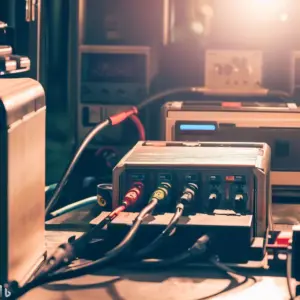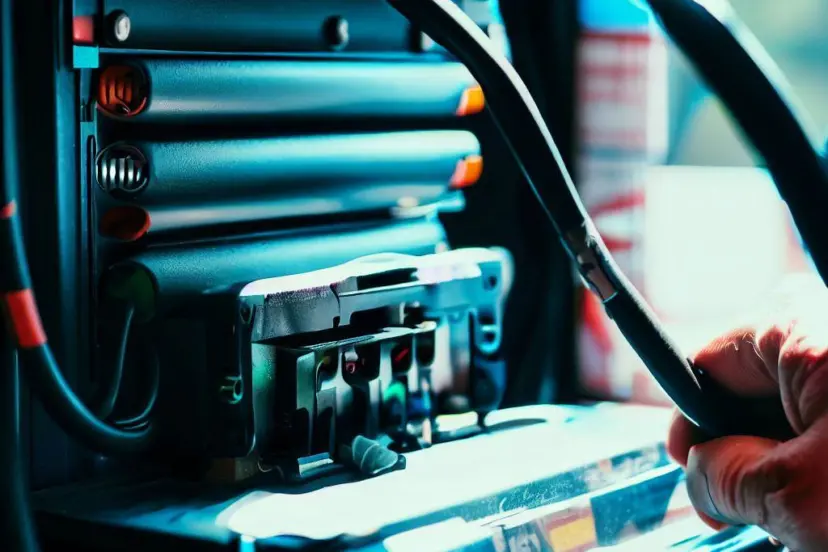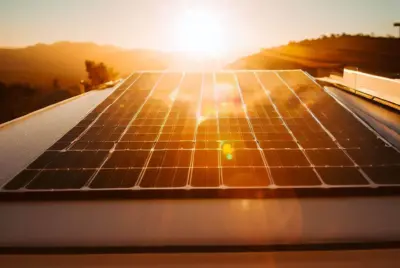Unleash the Power of Your RV: A Complete Guide to RV Battery Chargers
RV Battery Charger: Powering Your Adventures On the Road
Embarking on an RV adventure requires reliable power to fuel our journeys and provide the comforts of home on the road. The heart of your RV’s power system lies in the battery and its charger. In this comprehensive guide, we’ll explore the world of RV battery chargers, uncover the best practices for charging and maintaining your batteries, and discover the power options available to enhance your camping experience. We’ll cover everything from deep-cycle batteries to lead acid batteries to lithium-ion technology. So, let’s dive in and ensure you have the power you need for your next adventure.
Understanding RV Battery Chargers
RV battery chargers are the vital link between external power sources and your battery bank. These chargers take various forms, including converter, inverter, multi-stage, and more. They provide the necessary voltage and current to replenish your batteries, ensuring they’re ready to power your RV’s systems and appliances.
The Power of Converter Chargers
Converter chargers excel at converting 120-volt AC power to 12-volt DC power, charging your batteries while supplying power to your 12-volt systems. These chargers are commonly found in RVs and are ideal for campgrounds with access to shore power or when using a propane generator for RV use. They efficiently convert AC power, ensuring your battery bank remains charged and your RV systems run smoothly.
Versatility with Inverter Chargers
Inverter chargers offer a dual function: they convert 12-volt DC power from your batteries to 120-volt AC power, providing the convenience of using standard household appliances and electronics in your RV. In addition to charging your batteries, inverter chargers allow you to embrace the comforts of home even when boondocking or dry camping without shore power.
Optimizing Battery Life and Performance
 To maximize the lifespan and performance of your RV batteries, proper charging and maintenance are crucial. Let’s explore some key considerations.
To maximize the lifespan and performance of your RV batteries, proper charging and maintenance are crucial. Let’s explore some key considerations.
Charging Best Practices
Multi-Stage Charging: Utilize multi-stage chargers that provide four-stage smart charging, including bulk charging, absorption charging, float charging, and maintenance mode. This ensures efficient and controlled charging, avoiding overcharging or undercharging.
Battery Type Compatibility: Choose a charger that matches your battery type. Whether it’s deep cycle batteries, lead-acid batteries, or the advanced technology of lithium-ion batteries, selecting the right charger helps optimize charging efficiency and battery life.
Battery Maintenance and Care
Temperature Awareness: Ambient temperature affects battery performance. Be mindful of extreme heat or cold, as they can impact battery efficiency. Consider temperature compensation features in your charger to ensure optimal charging in different weather conditions.
Battery Sulfation Prevention: Regularly maintaining your batteries prevents sulfation, which can lead to reduced battery performance and capacity. Consider using battery maintainers or battery tenders when storing your RV to mitigate sulfation and prolong battery life.
Exploring Power Options
Beyond battery chargers, RV power options extend to solar-powered chargers, propane generators, and more.
Solar-Powered Charger
Solar power is a sustainable and off-grid solution for recharging your batteries. Solar-powered battery chargers harness the sun’s energy and convert it into electricity, providing a convenient and environmentally friendly charging option, particularly for dry camping and boondocking adventures.
Propane Generators for RV Use
Propane generators are reliable backup power sources when shore power or solar energy is unavailable. These generators provide AC power and ensure uninterrupted access to essential appliances and systems in your RV.
How Long Does It Take to Charge an RV Battery?
As an avid RV camper and enthusiast, I understand the importance of keeping your battery charged for a smooth and uninterrupted journey. No one wants a dead battery so, let’s dive into the factors that can influence the charging time and explore some helpful suggestions to optimize this process.
Factors Affecting Charging Time
Several factors come into play when determining the charging time for dead batteries. Firstly, the battery’s current state of charge plays a significant role. If your battery is completely depleted, it will take longer to charge than a partially discharged battery. The capacity of your battery is another critical factor. Larger battery banks may require more time to charge fully.
The charging method you choose also affects the time it takes to charge your vehicle batteries. Different options include solar panels, generators, and shore power. Solar charging is an environmentally friendly option, but it generally takes longer as it relies on sunlight intensity. Generators, especially propane generators designed for RV use, can charge your battery faster due to their higher power output. Shore power, when available, provides the quickest charging option.
Helpful Suggestions for Efficient Charging
To optimize the charging time of your RV battery, here are some helpful suggestions:
Invest in a Propane Generator for RV Use: Consider a high-quality propane generator specifically designed for RVs. These generators offer ample power output, efficient fuel consumption, and quieter operation than traditional gasoline generators.
Know Your Battery Capacity and State of Charge: Understand your battery’s capacity and regularly monitor its charge state. This knowledge will help you estimate the approximate charging time needed.
Consider Multiple Charging Sources: Utilize a combination of charging sources. For instance, utilize solar panels during the day for slow but steady charging, and supplement them with a propane generator for faster charging. And when you are able to, use a trickle charger when the RV is in storage to help with lost battery performance.
Optimize Energy Consumption: Prioritize energy-efficient practices to minimize battery depletion. Use LED lighting, turn off unnecessary appliances, and utilize efficient heating and cooling methods to reduce power consumption.
Invest in a Smart Charger: Consider a smart charger that monitors and regulates the charging process. These chargers prevent overcharging and ensure a safe and efficient charging experience.
The charging time for a dead battery can vary based on factors such as battery capacity, the current state of charge, and the chosen charging method. Investing in a propane generator designed for RV use can significantly reduce the charging time, giving you more power in less time. Remember to understand your battery’s specifications, monitor its state of charge, and explore multiple charging sources for optimal efficiency. By following these suggestions, you can keep your RV battery charged and ready for your next adventure on the open road.
Can I Use a Regular Car Battery Charger for My RV Battery?
Understanding the Differences
When it comes to charging batteries, it’s important to consider the differences between regular car batteries and RV batteries. Car batteries are designed for short bursts of high-energy output to start the vehicle, while RV batteries, especially deep-cycle batteries, are built to provide a steady and sustained flow of power over an extended period.
The Limitations of Regular Car Battery Chargers
While a regular battery charger for a car may technically be capable of charging an RV battery, it’s not the most optimal solution. Regular car battery chargers often lack the specific charging profiles and settings required to charge deep-cycle RV batteries properly. They may not provide the appropriate charging voltage and current levels needed for efficient and safe charging.
Helpful Suggestions and Reasons
To ensure the best charging experience for your RV battery, I recommend investing in a charger specifically designed for deep-cycle batteries or utilizing alternative charging methods. Here’s why:
Compatibility and Safety: Chargers specifically designed for RV batteries have charging profiles and settings tailored to meet the needs of deep-cycle batteries. This ensures proper and safe charging without risking damage to the battery or its lifespan.
Efficiency and Optimal Performance: Deep-cycle battery chargers are optimized to provide the correct charging voltage and current levels needed for efficient and effective charging. This helps extend the battery’s lifespan and ensures it delivers consistent and reliable power during your RV adventures.
Versatility and Additional Features: Dedicated RV battery chargers often come with additional features like multi-stage charging, desulfation modes, and temperature compensation. These features contribute to the longevity and performance of your battery.
While a regular car battery charger may work in a pinch, it’s not ideal for charging your RV battery. To ensure compatibility, safety, efficiency, and optimal performance, it’s best to invest in a charger specifically designed for deep-cycle batteries or explore alternative charging methods.
By using a charger tailored to the unique needs of RV batteries, such as a propane generator for RV use, you can prolong the lifespan of your battery, maintain its optimal performance, and enjoy uninterrupted power during your RV adventures. So, consider making the right choice for your RV battery and embrace worry-free camping experiences.
What Is the Average Lifespan of an RV Battery Charger?
As an enthusiastic RV camper and advisor, I’m often asked about the lifespan of RV battery chargers. It’s essential to understand the average lifespan of an RV battery charger to ensure reliable power during your adventures. So, let’s delve into this topic and provide helpful suggestions and reasons behind my suggestions.
Understanding Lifespan and Factors Affecting It
The average lifespan of an RV battery charger can vary depending on several factors. One crucial factor is the quality of the charger itself. High-quality chargers, such as those designed for RV use, are often built with durable components and undergo rigorous testing, resulting in a longer lifespan.
Another factor that impacts lifespan is usage patterns. If your charger is consistently subjected to heavy usage or high-demand charging scenarios, it may experience more wear and tear, potentially shortening its lifespan. Additionally, environmental conditions, such as extreme temperatures and humidity, can affect the longevity of the charger.
Helpful Suggestions and Reasons
To maximize the lifespan of your RV battery charger, here are some helpful suggestions:
Invest in a High-Quality Charger: Opt for a reputable brand and invest in an RV battery charger specifically designed for the demands of RV use. These chargers are often built with robust components and come with reliable warranties, ensuring a longer lifespan.
Follow Proper Charging Practices: Adhere to the manufacturer’s guidelines and recommendations for charging your RV battery. Avoid overcharging or undercharging, as these practices can strain the charger and potentially reduce its lifespan. Utilize the appropriate charging modes and settings for your battery type.
Ensure Proper Ventilation and Environmental Protection: Install your charger in a well-ventilated area to prevent overheating. Protect it from extreme temperatures, moisture, and dust to minimize the risk of damage and extend its lifespan.
Perform Regular Maintenance: Regularly inspect your charger for any signs of wear, loose connections, or corrosion. Clean the charger’s terminals and ensure a secure connection to the battery. Maintenance and timely repairs can help prolong its lifespan.
The average lifespan of an RV battery charger can vary depending on factors such as quality, usage patterns, and environmental conditions. By investing in a high-quality charger, following proper charging practices, ensuring proper ventilation, and performing regular maintenance, you can extend the lifespan of your RV battery charger.
Remember, a propane generator for RV use can serve as an excellent alternative power source when needed. By implementing these suggestions, you can enjoy a longer lifespan from your RV battery charger and have peace of mind knowing that you have reliable power to fuel your adventures on the road.
What Is the Best Type of RV Battery Charger for Dry Camping?
As an avid RV camper and advisor, I understand the importance of a reliable battery charger, especially when planning dry camping adventures. Choosing the right RV battery charger for dry camping can make a significant difference in ensuring a continuous power supply for your essential devices. So, let’s dive into this topic and provide helpful suggestions and reasons behind my recommendations.
Understanding the Needs of Dry Camping
Dry camping, also known as boondocking, involves camping in remote areas without access to external power sources. In such scenarios, your RV’s battery becomes your primary power source. Therefore, it’s crucial to have a battery charger that can efficiently charge your batteries and keep them ready for extended periods without shore power.
The Best Type of RV Battery Charger for Dry Camping
When it comes to dry camping, a charger with the following features and characteristics is highly recommended:
Multistage Charging Capability
Look for an RV battery charger that offers multistage charging capability. This means the charger can adjust the charging process to match the battery’s needs, ensuring efficient charging while preventing overcharging or undercharging. Multistage chargers typically have bulk, absorption, and float charging stages, optimizing the battery’s charging process.
High Amp Output and Fast Charging
A battery charger with a high amp output is beneficial for dry camping scenarios, where you may have limited access to charging sources. This allows for faster charging, minimizing downtime and maximizing the use of available power. Look for chargers with ample amp output to suit your battery bank’s capacity.
Compatibility with Deep-Cycle Batteries
Deep-cycle batteries are commonly used in RVs for their ability to provide sustained power. Ensure that the RV battery charger you choose is compatible with deep-cycle batteries. Look for chargers specifically designed for deep-cycle batteries, as they provide the appropriate charging profiles and settings for these battery types.
Built-In Safety Features
Safety is paramount when it comes to charging your RV batteries. Opt for a charger that comes with built-in safety features such as overcharge protection, reverse polarity protection, and temperature compensation. These features help safeguard your batteries and ensure a safe charging process.
When it comes to dry camping, having the best type of RV battery charger is essential for a hassle-free experience. Look for a charger that offers multistage charging, high amp output, compatibility with deep-cycle batteries, and built-in safety features. By choosing the right charger, you can keep your batteries charged efficiently, maximize your power usage, and fully enjoy your dry camping adventures without worrying about running out of power.
Remember, having a reliable propane generator for RV use as a backup power source can further enhance your dry camping experience. So, select the ideal charger, pack your essentials, and confidently embark on memorable dry camping journeys.
Your RV’s power system is essential for a successful and comfortable camping experience. Every aspect is crucial in ensuring reliable power on the road, from converter chargers to inverter chargers, proper charging practices to battery maintenance, and exploring alternative power options.
By understanding the capabilities and benefits of different battery chargers, adopting best practices for charging and maintenance, and exploring diverse power options, you can optimize the lifespan and performance of your batteries, providing the power you need for all your adventures. So, embrace the freedom of the open road, powered by your RV battery charger, and create memories that will last a lifetime.
FAQs
- Can I leave my RV battery charger plugged in all the time? Answer: It is generally safe to leave your RV battery charger plugged in, especially if it has smart charging capabilities. Smart chargers are designed to monitor and adjust the charging process to avoid overcharging. However, referring to the manufacturer’s instructions and recommendations for your specific charger is always a good idea.
- Can I charge different types of batteries simultaneously with an RV battery charger? Answer: It depends on the charger’s capabilities. Some chargers are designed to handle multiple battery types, while others may be specific to a particular type. Make sure to check the charger’s specifications and instructions to ensure compatibility and avoid damaging the batteries.
- How long does it take to fully charge an RV battery with a charger? Answer: The charging time can vary depending on factors such as the battery’s capacity, its current state of charge, the charger’s output, and the charging method. On average, it may take several hours to fully charge an RV battery. It’s best to consult the charger’s manual for more precise charging time estimates.
- Can I use a regular car battery charger for my RV battery? Answer: While car battery chargers may seem similar to RV battery chargers, using a regular car battery charger for RV batteries is generally not recommended. RV batteries, particularly deep-cycle batteries, have different charging requirements. It’s best to use a charger specifically designed for RV batteries to ensure proper charging and battery longevity.
- Are there any safety precautions I should follow when using an RV battery charger? Answer: It’s important to follow safety guidelines when using an RV battery charger. Avoid exposing the charger to water or extreme temperatures, and ensure proper ventilation during charging. Follow the manufacturer’s instructions for correctly connecting and disconnecting the charger, and use caution when handling electrical components.




